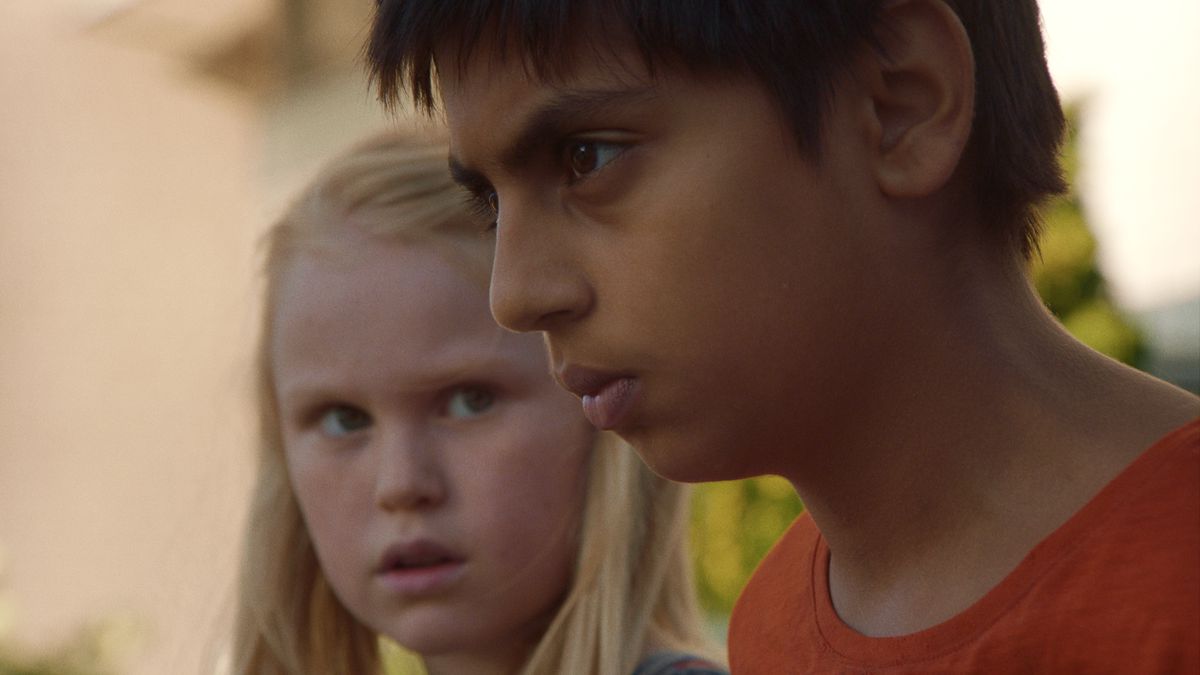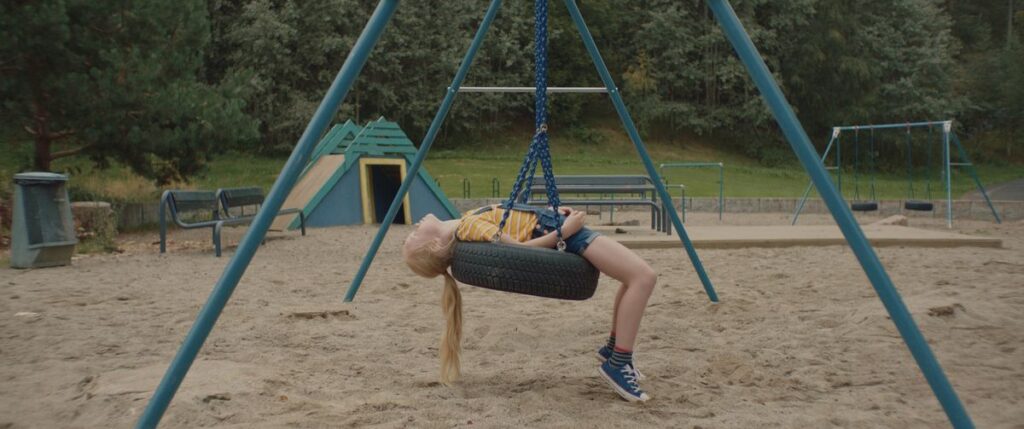With a new movie version of Stephen King’s Firestarter just arriving and a third adaptation of his novel Salem’s Lot on the way, it’s worth wondering whether creators will ever run out of King material to recycle or reboot. If they do eventually hit a point of diminishing returns on reusing the same material — and with King books now being mined for TV miniseries on every streaming network from HBO Max to Epix, they might — at least there’s the option of making stories that feel like Stephen King classics. Stranger Things, a series openly inspired by King’s work, is the most prominent and successful example, while projects like Midnight Mass or Marrowbone often capture one particular aspect or another of King’s writing. And the chilling new horror movie The Innocents comes closer to feeling like a King story than most actual adaptations of his work do.
There’s no one model for what “a Stephen King story” feels like — the same man wrote the streamlined fantasy novel Eyes of the Dragon, the detail-soaked post-apocalyptic epic The Stand, and the monster-free coming-of-age story “The Body,” later adapted as Stand By Me. The Innocents specifically feels like King in the “kids in trouble” mode he brought to stories as diverse as Needful Things, The Institute, It, and yes, Firestarter — all stories where children are struggling to deal with threats far beyond their experience range, with the adults around them proving helpless at best and harmful at worst.
Written and directed by Norway’s Eskil Vogt (co-writer of frequent best-of-2021 list-maker The Worst Person in the World), The Innocents follows a group of children navigating their growing supernatural powers. But while that description seems a little familiar in an era of young-supers stories, from Brightburn to Raising Dion to Midnight Special, The Innocents’ execution is specific and refreshing. Vogt makes deliberate, thoughtful choices that amp up the story’s drama and horror without ever turning it into the kind of action-centric special-effects showcase Americans have come to expect even from their low-budget superpower stories. And he channels a particularly King-esque sense of horror, as the children come to understand just how useless the adults in their lives are and how alone they are as a result.
Image: IFC Midnight
Rakel Lenora Fløttum stars as Ida, an 8-year-old Norwegian girl whose family has just moved to an apartment complex in a new city after her father took a new job. Ida’s parents are loving and supportive, but their time is heavily occupied by the move and by Ida’s autistic older sister, Anna (Alva Brynsmo Ramstad), who is nonverbal and mostly absorbed with sounds and textures. Periodically tasked with looking after Anna while their parents are busy, Ida clearly sees her as a burden and a slight embarrassment, especially as she’s awkwardly trying to make new friends in a new place.
As Ida starts to bond with local boy Ben (Sam Ashraf), Anna finds her own companion in a younger girl, Aisha (Mina Yasmin Bremseth Asheim), who can communicate with her telepathically. Ben also turns out to have low-grade psychic powers, but when the four children are together, they quickly get stronger. It’s never clear where these abilities come from, or whether their exponential growth is the result of group proximity or practice. But their rapid development has unsettling results when one of the four starts using their growing abilities to act out in violent ways — and has no adult moral boundaries to limit what comes next.
That setup sounds a bit like Josh Trank’s 2012 faux-found-footage supers movie Chronicle, but in execution, The Innocents ends up feeling a lot more like Tomas Alfredson’s low-key 2008 vampire movie Let the Right One In. The kids’ performances are naturalistic and low-key, and the writing lets them feel a lot more like kids than movie kids normally do. They aren’t given to talking about their feelings or making weighty, telling statements that lay out important themes about power and responsibility. They react to the world instinctively and mostly internally, and express themselves through actions more than through explanations.
At times, the naturalistic approach does leave the movie feeling slow and unfocused. The glacial development of the kids’ powers leads to a lot of repetition as they experiment and interact. Dread lurks over most of the film, from the opening sequence where Ida hurts Anna just to see her response up until a climactic act that’s all the more startling because it’s so understated. But that dread never resolves on a scale large enough to feel cathartic — one thing that marks The Innocents as different from its seeming inspirations. Even Let the Right One In had its own version of an explosive finale.
One of the most remarkable (and Stephen King-like) things about The Innocents is how thoroughly unsentimental it is about childhood. Kids, the film implies, are just as likely to commit atrocities as adults are — they’re only limited by their lack of power and their lack of prejudice. Where movies often consider children off-limits as targets for the worst of whatever’s lurking in the dark, Vogt visits most of his worst horrors on, as the title says, innocents. The horror elements are understated, but keen — there’s a sequence of animal cruelty that may be hard for pet owners to stomach, and the fact that it’s clearly meant to set up one character’s childish lack of empathy and obliviousness to consequences just makes it more unnerving. And the child cast isn’t any safer when things get dark.

Image: IFC Midnight
At the same time, there’s a compelling and particularly horrifying sense that none of what happens in the movie particularly comes as a surprise to them. These children are young enough to still expect and be confused by new experiences daily, with no ability to tell the difference between a commonplace occurrence and one that would baffle an adult as well. Just the way Ida never really considers telling her mother the truth about what’s going on in her life is a source of small, everyday terror for a feeling audience.
For patient viewers — the kind of audiences who enjoy King’s most sprawling thousand-page books because of the way they gradually create thoroughly immersive environments and characters — The Innocents is a wonder. The kid cast is believable and appealing, all the more so because they seem to be living through these childhood days of fear and wonder rather than performing them for a camera. That’s true even though that camera — courtesy of cinematographer Sturla Brandth Grøvlen — is unusually active, moving close in on Fløttum’s face as she tries to process new threats or new information and swirling upside down to unnerve and disorient viewers.
But performance and craft aside, The Innocents is mesmerizing because of its particular take on the banality of evil, on the everyday sense that no one ever fully knows what’s going on in someone else’s head. The parents here don’t realize their children are caught in a life-or-death struggle. The children can’t see how desperately they need help and intervention. Only the audience knows everything, and sees — early on, and with a slow-building sense of sickening inevitability — where this supernatural conflict is going. It’s the type of perspective King excels at creating, but here, it comes with a sense of lulling calm and slow-burn stillness that’s as frightening as any of the third-act explosions he’s ever written.
The Innocents is playing in limited theatrical release and is available to rent or buy on Amazon, Vudu, and other digital platforms.

